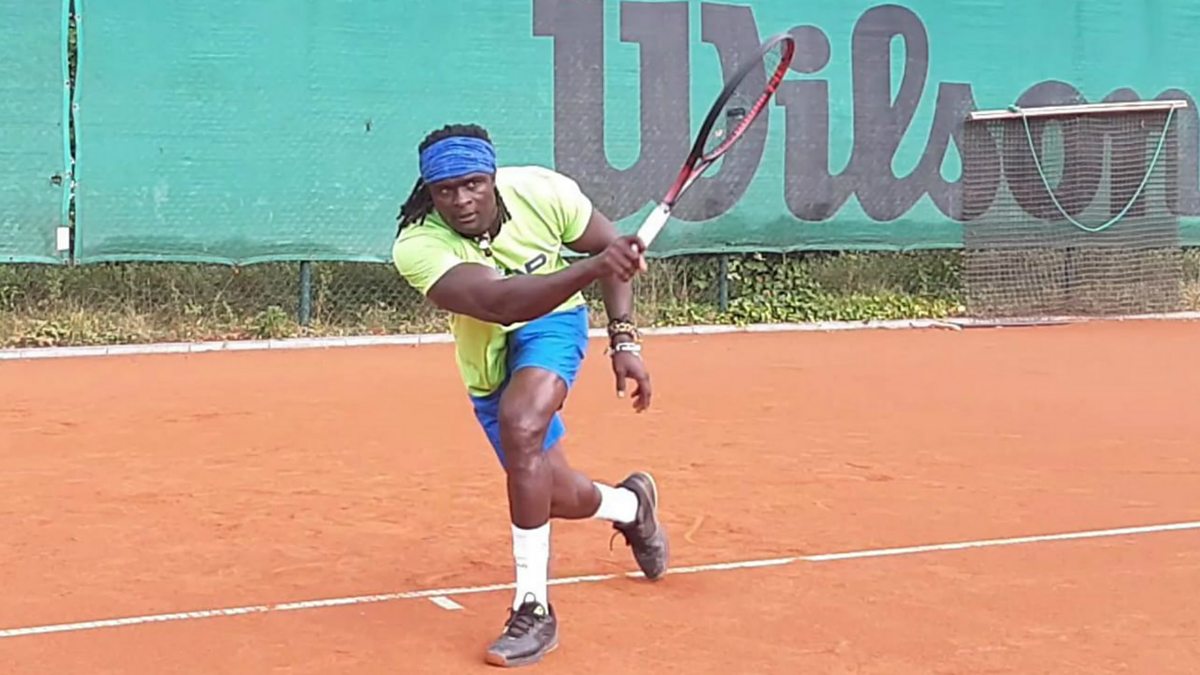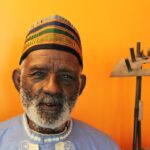Sam Jalloh is a tennis coach in the UK who’s life went from living in a slum in Sierra Leone to chasing his dream of donning the country’s national team’s tracksuit, playing the sport he loves so dearly. This is his story.
Life was really tough growing up in Sierra Leone because my mum and dad have never had any education. So they had two to three jobs. I always made a joke that my parents worked eight days a week, they never took a day off. My dad’s salary was nothing and same with my mum, just to make ends meet. We lived in a very shanty town, like a complete slum. We had no running water, no electricity. We all slept on the floor on cardboards my parents got from the dustbins.
We managed to get on with it.
I was quite young when I first saw tennis. One of the jobs my mum used to do was that she’d go up to the mountains, the forest to cut wood for firewood and charcoal to sell in the market. So everytime we went on this five-mile walk, we passed by the Hill Station Tennis club. I remember standing near the fence, looking at the tennis court going, ‘wow, that’s a beautiful sport I would like to play.’ Since then I was transfixed with this game and I wanted to play because all the players looked so well dressed up too. But it was mainly white people that played at the time.
When I went home, to my dad, I go, ‘dad I want to play tennis. I love this sport and that is what I want to do.’ He looked at me and said, ‘If I ever see you play that rich white man sport I’m going to cut all your fingers’ and he wasn’t joking. The reason for this is, he wanted me to be a doctor. He worked all his life and his salary was barely £10 a month so he didn’t want me to end up like him. He had a better dream for me, but at that time I was just a child, I thought he was being a tough guy.
At the age of six my dad had an offer: the guy who owned the house we were living in, wanted to adopt a child because all of his had grown and moved out. He wanted someone to do housework for him. So the landlord said to my dad, ‘If I can adopt your child I can make your rent three times cheaper’ and my dad without thinking said ‘yes you can have him.’
I was young, crying whilst walking away from my family. We were so poor, had one meal a day, I was barefoot but I loved them. It was the toughest challenge ever in my life. When I arrived, my new grandmother, the landlord’s mother, was very disciplined. I was not allowed to make any mistakes, there was constant whooping and I was not allowed to leave the compound. When I was nine, I had had enough and ran to the streets.
A far away dream found
My mum and dad had separated so I moved in with my mum at Hill Station, not far from the tennis club. The tennis club was only 10 yards away from the bungalow. So now I realised that my far away dream was becoming a reality. The reason I took up tennis so seriously is that I heard one of the kids who signed up say, ‘so and so has gone to Togo in West Africa to play in the ITF Junior and you know they give them $250?’ and I flipped out. Like that’s a lot of money! I thought.
And for me coming from such a poor family, $250? I don’t think my family had ever had that kind of money in our history. I wanted this $250. $150 was good to take care of my family for half a year, and with $50 I could pay my school fees and then I could take it from the tournament win plus I was desperate to wear one of those national tracksuits. So this is how my quest for tennis took a really really good turn.
I started as a ball boy on the courts. One time there was a Sierra Leonean Lebanese guy, Raymond Breeze, he came to play tennis one evening and we were playing Boldbat tennis barefoot. Three of my toes were bleeding, his toes were bleeding, but I would just not give up. I didn’t want to lose, and he didn’t want to lose. We went back and forth for so long.
When we finished, he said to me, ‘if you have a proper racket you’ll become a national champion’ and I thought, my goodness this man is a bit crazy. Then I thought about it properly and said, he must be right because he played tennis and he understood how it worked. So that gave me the urge to play tennis. All those encouragement did something for me in the future.
The national team dream
When I had the realisation that I could play for the Sierra Leonean national team, I was training 10 days a week. Honestly, I went beyond my parents eight-day week and said this is a 10-day week project. I aimed to train round the clock. In 1995, when I was 13, I had the opportunity to play my first national tournament in Sierra Leone. I was in the quarterfinals and I noticed a white guy was standing outside watching my match. I think he was asking one of the coaches why I was playing without shoes and the coach said I like to play without shoes.
It was close to 38 degrees and it was really hot on the concrete floor. I won the quarter finals and then the next day, funny enough, this guy turned up with a pair of brand new tennis shoes. Mind you, I had never played with tennis shoes before. I put them on, I was in the first set and then I realised this was such a bad idea for me to experiment in playing tennis with the shoes.
Here I was like a big fool standing on the court, thinking my goodness, these things are killing my feet. I was missing my steps, I couldn’t move well, they were uncomfortable and then I lost the first set. I went to the umpire and I said ‘please sir can I take these shoes off because they are actually killing me?’ I took them off and I lost in three sets.
My dreams were shattered. I remember lacing the shoes together and hung them on my neck and walked four miles back home cursing the guy like,’why in the name of God, did you bring me these shoes?’
A civil war versus personal strife
In 1998, ECOMOG, the West African intervention force led by Nigeria stormed Freetown to drive the rebels out and retake the government. So on this day there was a fighting going on outside. My best friend who is my hero, Al-Mami came in and tapped me on the shoulder saying ‘hey, Sam you need to wake up’. So I got up from bed, and put on my clothes. We went outside and all you could hear was the shooting and missiles whistling. The military was dropping bombs in so-called key areas.
We were just less than a mile away and all of a sudden I heard bullets and then when I turned round, Al-Mami had been shot multiple times in the chest. I watched him face down gasping for air, almost like he wanted to talk to me, then a few seconds later he took his last breath. At the same time, while he was lying there lifeless, my mum was standing there, she wasn’t speaking. She was really just staring at me in my eyes and I could tell what my mum was thinking that I don’t want you to die like this.
And I remember from that day I said to myself, you know what, I’m not invincible, I’m going to try to stay alive so that I can do something with my life to make my mum proud and also to make Al-Mami proud, my hero. He always wanted me to be a better tennis player and he did everything to make sure I played tennis.
Sam Jalloh, despite the civil unrest in his country, went on to train harder than ever before. Played in a tournament again, reached the semifinals and eventually won the tournament. He also finally donned the tracksuit for the national team at the time to play for Sierra Leone.
Now living in the UK, coaching tennis, he runs a foundation which provides sporting activities for underprivileged children in Sierra Leone, aiming to keep them away from crime, drugs and teenage pregnancies.














